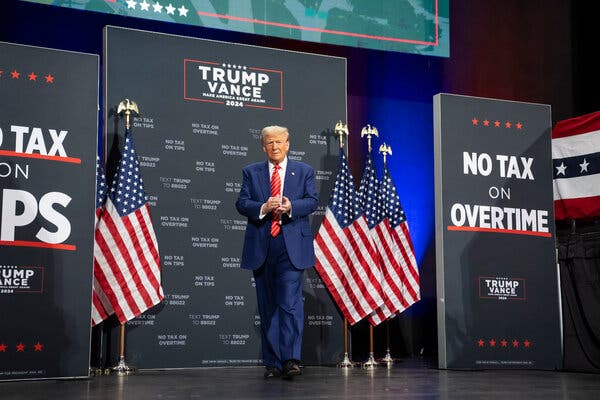Key Republican Groups Opposing Trump's Tax Cuts

Table of Contents
The passage of Trump's tax cuts in 2017 wasn't a monolithic Republican affair. Despite the party's unified front in many legislative battles, a significant schism emerged, with several key Republican groups opposing Trump's tax cuts. This internal conflict highlighted deep divisions within the party regarding fiscal policy, economic fairness, and the role of government. This article will examine the key Republican groups that voiced their opposition and analyze their primary arguments.
The Conservative Movement's Critique of the Tax Cuts
A surprising source of opposition to the tax cuts came from within the conservative movement itself. Many fiscal conservatives prioritized responsible budgeting and long-term fiscal sustainability over immediate tax reductions.
Fiscal Responsibility Concerns:
- Increased National Debt: Critics argued that the tax cuts would dramatically increase the national debt without corresponding spending cuts, jeopardizing the nation's long-term economic stability. They pointed to projections showing a significant rise in the deficit over the following decade.
- Lack of Targeted Spending Cuts: The absence of significant spending cuts to offset the revenue loss from the tax cuts was a major point of contention. Conservatives argued that the tax cuts were fiscally irresponsible without a simultaneous effort to reduce government spending.
- Unsustainable Fiscal Policy: Many prominent conservative think tanks, such as the Committee for a Responsible Federal Budget, voiced strong opposition, arguing the tax cuts represented unsustainable fiscal policy. They emphasized the long-term consequences of accumulating debt.
These concerns were fueled by data showing a projected surge in the national debt and warnings from economists about the potential for higher interest rates and slower economic growth.
Regressive Tax Policy Arguments:
Another core argument against the tax cuts centered on their regressive nature. Conservatives who prioritized tax fairness argued that the benefits disproportionately favored the wealthy, exacerbating income inequality.
- Tax Fairness Concerns: Critics highlighted that the majority of the tax benefits went to high-income earners and corporations, while offering minimal relief to the middle class and low-income individuals.
- Exacerbating Income Inequality: The tax cuts were criticized for widening the gap between the rich and the poor, undermining the principles of economic equality and opportunity championed by many conservatives.
- Lack of Investment in Human Capital: Some argued that the resources lost to tax cuts could have been better invested in education, infrastructure, and other areas that promote long-term economic growth and opportunity for all.
The Role of Moderate Republicans in Opposing the Tax Cuts
Moderate Republicans also played a crucial role in opposing Trump’s tax cuts, albeit for different reasons. Their concerns often revolved around the potential impact on social programs and a broader focus on economic fairness and sustainable growth.
Concerns about the Impact on Social Programs:
Moderate Republicans expressed deep concern about the potential cuts to vital social programs that would be necessary to offset the revenue lost through the tax cuts.
- Cuts to Social Safety Net: They argued that reducing funding for programs like Medicare, Medicaid, and Social Security would disproportionately harm vulnerable populations and undermine the social safety net.
- Impact on Essential Services: Concerns were raised about potential cuts to critical government services, such as education, infrastructure, and public health, impacting the overall well-being of the population.
- Protecting Vulnerable Populations: Moderate Republicans emphasized the importance of protecting vulnerable populations and ensuring access to essential services, arguing that the tax cuts prioritized tax cuts for the wealthy over the needs of the most vulnerable.
Focus on Economic Fairness and Growth:
Many moderate Republicans argued that the tax cuts were poorly designed to stimulate sustainable economic growth and that they did little to promote equitable wealth distribution.
- Trickle-Down Economics Concerns: They questioned the effectiveness of trickle-down economics, arguing that tax cuts for corporations and the wealthy did not guarantee job creation or widespread economic benefits.
- Lack of Investment in Infrastructure: They advocated for greater investment in infrastructure and human capital as key drivers of sustainable economic growth.
- Promoting Inclusive Growth: Moderate Republicans stressed the importance of policies that promote inclusive economic growth, ensuring that the benefits of economic expansion are shared broadly across the population.
Influence of Specific Republican Groups and Individuals
Several prominent Republican figures and organizations actively opposed Trump's tax cuts.
Examples of Prominent Republican Figures and Groups:
- Senator Bob Corker: A prominent Republican senator known for his fiscal conservatism, Corker voiced strong reservations about the tax cuts' potential to increase the national debt. He publicly expressed his concerns about the lack of offsetting spending cuts. Numerous news articles documented his opposition.
- The Committee for a Responsible Federal Budget: This non-partisan organization, while not strictly a "Republican group," heavily influenced Republican fiscal conservatives. Their detailed analyses of the tax cuts’ impact on the national debt played a significant role in shaping the debate.
- Individual Representatives: Various Republican representatives in the House also voiced concerns, although often quietly due to party pressure. Their concerns, documented through internal memos and private conversations with journalists, highlighted internal dissent within the party.
Conclusion
The opposition to Trump's tax cuts revealed significant internal divisions within the Republican party. While some Republicans prioritized immediate tax reductions, others focused on fiscal responsibility, long-term economic sustainability, and the need for equitable tax policies. The arguments ranged from concerns about the increasing national debt and regressive nature of the tax cuts to worries about cuts to social programs and a lack of focus on inclusive economic growth. These debates highlight the complex and multifaceted nature of fiscal policy and the ongoing tension between different factions within the Republican party.
Learn more about the ongoing debates within the Republican party by exploring resources from the Committee for a Responsible Federal Budget and engaging in the conversation using #RepublicanTaxDebate.

Featured Posts
-
 Black Hawk American Airlines Collision Analysis Of Pilot Rebecca Lobachs Actions
Apr 29, 2025
Black Hawk American Airlines Collision Analysis Of Pilot Rebecca Lobachs Actions
Apr 29, 2025 -
 Hungary Rejects Us Urging To Curtail Chinese Economic Relations
Apr 29, 2025
Hungary Rejects Us Urging To Curtail Chinese Economic Relations
Apr 29, 2025 -
 Minnesota Announces Winning Snow Plow Names
Apr 29, 2025
Minnesota Announces Winning Snow Plow Names
Apr 29, 2025 -
 Capital Summertime Ball 2025 Tickets Avoid Scams And Buy Safely
Apr 29, 2025
Capital Summertime Ball 2025 Tickets Avoid Scams And Buy Safely
Apr 29, 2025 -
 Sukces Porsche 911 W Polsce Model Za 1 33 Mln Zl Hitem Sprzedazy
Apr 29, 2025
Sukces Porsche 911 W Polsce Model Za 1 33 Mln Zl Hitem Sprzedazy
Apr 29, 2025
